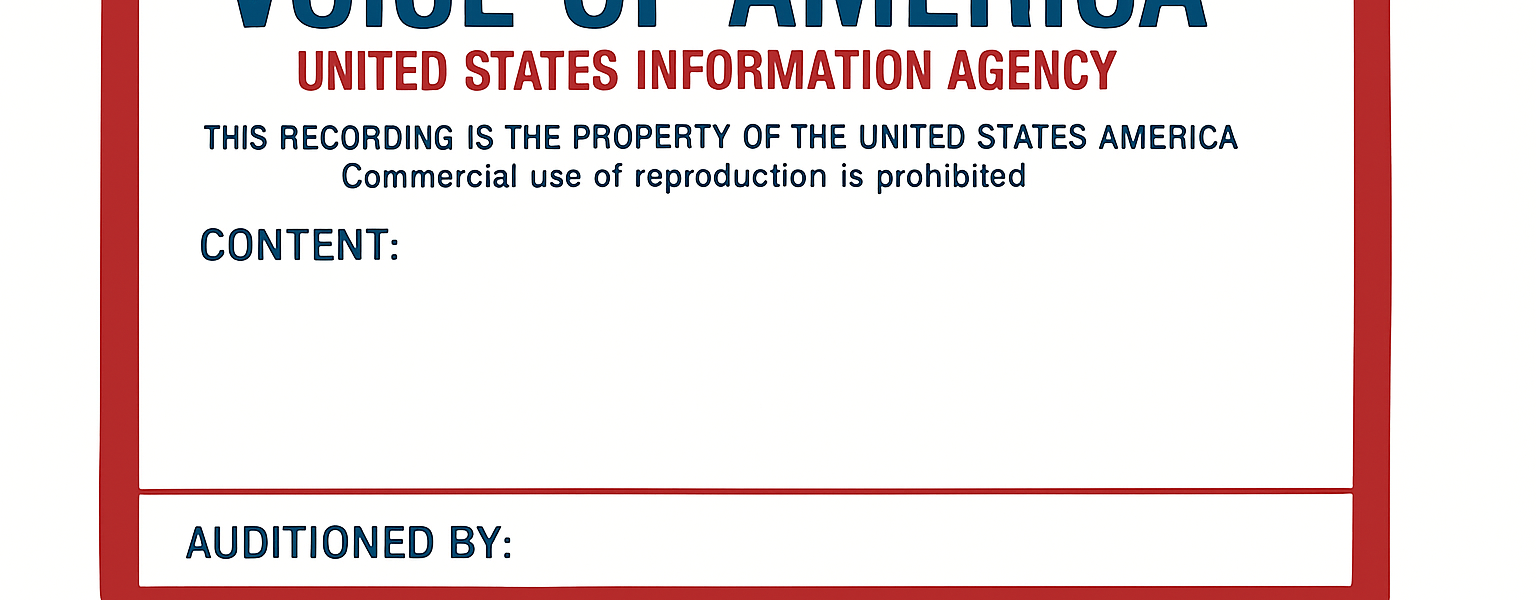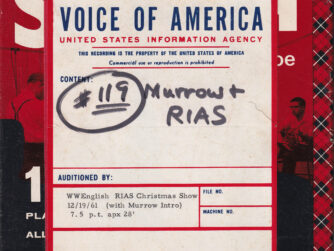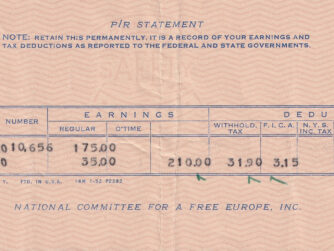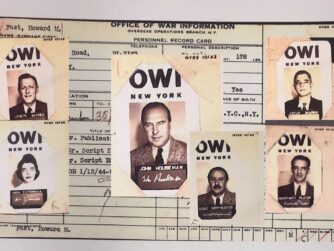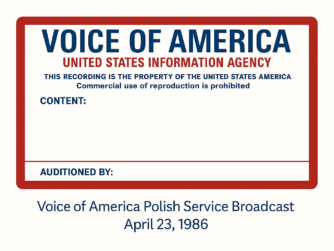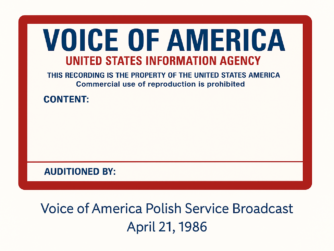Summary of the Voice of America Polish Service Broadcast
July 21, 1986 — 8:00 p.m. Warsaw time
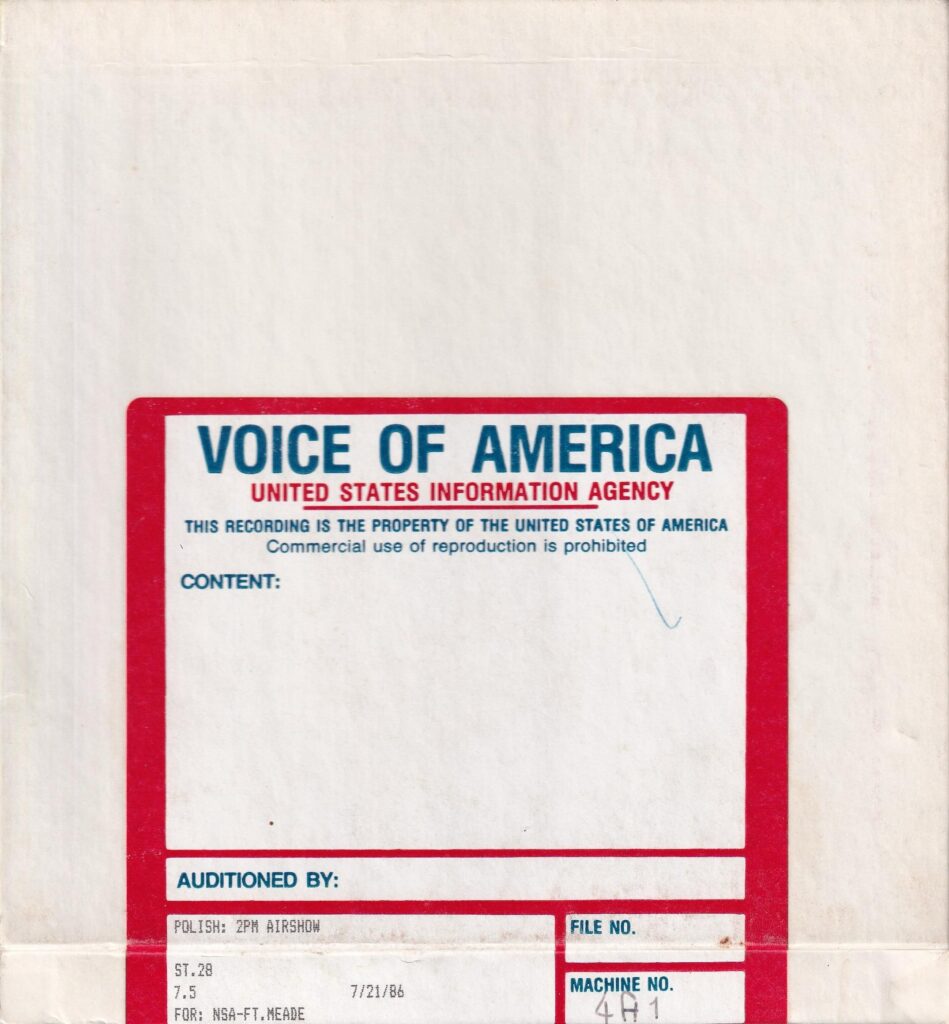
This rare recording of a Voice of America Polish Service evening program from July 21, 1986, survives because it was made at the request of the National Security Agency. It was likely used as a Polish-language training aid for U.S. government personnel. Today, it offers valuable educational and historical insight—especially for younger generations interested in how Poles accessed uncensored information during the communist era.
During much of the Cold War, the Voice of America’s (VOA) audience in Poland lagged. Candid reporting on the Katyn massacre and other communist atrocities was restricted by the State Department, the United States Information Agency (USIA), and compliant VOA managers and editors. Bureaucratic bloat, underfunding of foreign language services, and editorial timidity further weakened its credibility. By contrast, Radio Free Europe (RFE) became the premier broadcaster to Poland. By the 1970s, RFE’s Polish Service commanded an audience five times larger than VOA’s.1
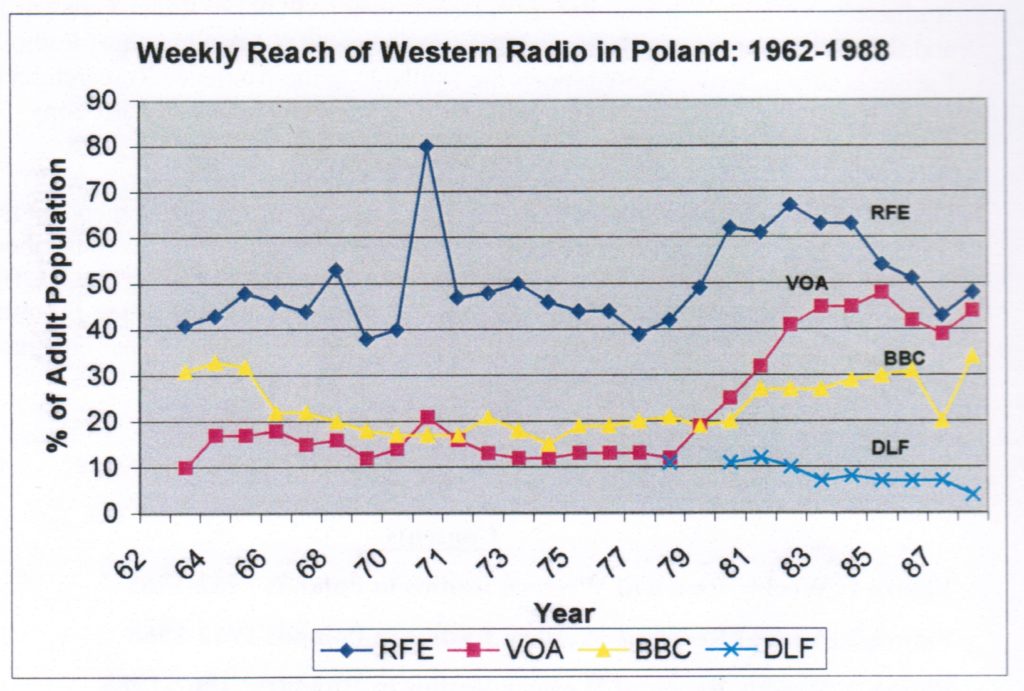
VOA regained ground only under President Ronald Reagan. His administration replaced senior leadership, empowered language services, and lifted restrictions on reporting about the Soviet Union, the Katyn massacre, communist atrocities, and human rights abuses. The 1986 recording of the VOA Polish broadcast demonstrates how the Polish Service was able to originate expanded news items about events in Poland—something that had not been permitted before 1981, when VOA’s foreign language services were confined to relaying stories produced by the central English newsroom. Those English-language reports often arrived late, lacked sufficient detail, or ignored issues most relevant to audiences in Poland and elsewhere in East-Central Europe. Not surprisingly, VOA’s English-language broadcasts attracted minimal listenership inside Poland. Throughout the 1960s and 1970s, VOA’s Polish Service continued to lag far behind RFE in audience reach and impact.
By 1986, however, the Polish Service operated with much greater independence and resources. It maintained a full-time staff correspondent in Rome to cover Pope John Paul II’s activities and statements on Poland and broader international issues—something unthinkable for a VOA foreign-language service before the Reagan administration reforms. The 1986 recording also illustrates the professional character of VOA’s Polish-language reporting under its new management. The Service consistently avoided rhetoric that might appear to endorse violence or language that demeaned General Wojciech Jaruzelski or other communist leaders. At the same time, it gave significant airtime to the voices of Solidarity and the Catholic Church—figures systematically silenced by the communist-controlled media in Poland.
This approach represented a model of responsible journalism. It had not always been so at the Voice of America. During World War II, VOA production chief John Houseman (later described as the first VOA Director) hired Soviet sympathizers and Communist Party members. The chief VOA English news writer and editor was Howard Fast, the future recipient of the Stalin Peace Prize (1953). The Truman administration replaced the pro-Soviet VOA Polish Service staff and other pro-Soviet officials and broadcasters with independent journalists such as Zofia Korbońska, a Polish anti-Nazi fighter and anti-communist resistor. Yet even these journalists soon lost much of their limited editorial independence under successive Republican and Democratic administrations — a problem that did not afflict Radio Free Europe. By contrast, under the Reagan administration, when this broadcast originated, the Polish Service enjoyed its greatest editorial freedom, used it responsibly, and contributed significantly to the peaceful fall of communism in Poland.
In later decades, after the Eastern European services were abolished, VOA’s editorial standards in the central newsroom and some foreign-language services shifted toward greater partisanship. News content included highly charged comparisons, such as likening President Donald Trump to Lenin, Stalin, or Mao, or amplifying without balance claims that he “met the definition of a fascist.” In the 2020s, some editors and reporters in VOA’s English newsroom avoided referring to Hamas atrocities as terrorism.2
The 1986 Polish Service recording provides a striking contrast. Nowhere did VOA Polish journalists describe Jaruzelski in such terms. Instead, in Wacław Bniński’s report from Rome, Jaruzelski emerges as a communist dictator who restricted the human rights of ordinary citizens and curtailed the activities of the Catholic Church — but not as a Stalinist, Maoist, or fascist. The distinction was deliberate: exaggeration would have undermined VOA’s credibility with its Polish audience.
Main News Bulletin, VOA Polish Service, July 21, 1986
The broadcast opened with the standard announcement and frequencies, followed by the Dziennik (News) anchored by Renata Lipińska and Zdzisław Mikulski.
- South Africa: Bishop Desmond Tutu reported that his talks with President P. W. Botha had failed; the U.K.’s Foreign Secretary Geoffrey Howe warned London would join sanctions if apartheid continued.
- Lech Wałęsa — full news: “Lech Wałęsa sharply criticized the limited amnesty announced by the PRL authorities. Wałęsa stated that prisoners would be forced to sign a declaration of loyalty before leaving prison. In a statement made yesterday, the Solidarity leader stressed that such conditions for release constitute an attempt to break the will of those imprisoned. The amnesty approved on Thursday by the Sejm of the PRL is to cover about 20,000 criminal prisoners and some of the roughly 350 political prisoners.”
- Cardinal Józef Glemp — full news: “Poland’s Primate, Cardinal Glemp, confirmed that the Church remains under strict surveillance by state authorities. He nevertheless expressed hope that the government would not object to a possible papal visit to Poland next year. During his visit to Italy, Cardinal Glemp said that in recent years, Poland had been on the brink of civil war. The Primate also expressed appreciation for General Jaruzelski as a man with whom one can talk.”
- FRG–USSR: West German Foreign Minister Hans-Dietrich Genscher held substantial talks in Moscow with Mikhail Gorbachev and Eduard Shevardnadze on East-West relations and disarmament.
- USA–USSR: The Washington Post reported on the Reagan plan, including a 50% reduction in strategic weapons and a possible postponement of SDI—potentially paving the way for a Reagan–Gorbachev summit later in 1986.
- Other items: Afghanistan (Najibullah accused Pakistan of undermining the Geneva talks); Spain (a Madrid bombing injured eight); U.K. (royal wedding preparations for Prince Andrew and Sarah Ferguson).
“Echoes of the Day in America and the World”
Hosted by Janusz Hewell, this segment focused on U.S.–Soviet arms discussions, Genscher’s Moscow visit, and a Politburo report on Chernobyl, citing serious procedural violations and listing officials disciplined or dismissed.
Full report by Wacław Bniński (Rome) — full text (translated)
“The Primate of Poland, Cardinal Józef Glemp, during a press conference in Italy, referred to relations between the Church and the authorities of the People’s Republic of Poland. This is reported by our Rome correspondent, Wacław Bniński.
On Sunday in Algero, a town on the north-western coast of Sardinia, a ceremony was held to present the Primate of Poland, Cardinal Józef Glemp, with the ‘Algero 25 April’ award for contributions to a culture of peace. In the afternoon, Cardinal Józef Glemp held a lengthy press conference.
The Sunday and Monday Italian press carried extensive passages from it. They appeared in the pages of Il Tempo, San Pastero, Avvenire, La Repubblica, Il Giornale, and L’Unità. The questions from Italian journalists referred to the general situation in the country after the imposition of martial law on society, the Primate’s impressions from talks with Zbigniew Bujak, Church–State relations, the scope and meaning of the amnesty adopted by the Sejm of the PRL, the previous talks held by Cardinal Józef Glemp with General Wojciech Jaruzelski, and of course the possible third pilgrimage of the Holy Father John Paul II to Poland, planned for June next year, and the possibility of visiting Gdańsk. Cardinal Józef Glemp explained that, so far, the matter of the third papal visit to his native country has not entered the stage of official planning. Nevertheless, the Cardinal is convinced that it will take place in June next year and that the Pope will visit Gdańsk.
‘We do not wish,’ said the Primate of Poland, ‘to give the papal journey a political overtone, especially an opposition-political overtone.’
Referring to his opening remarks at the press conference on the importance of dialogue—both in resolving internal social or political problems and international ones—the Primate of Poland said that he himself and the Church had been striving, since martial law was imposed on society, to prevent what he called a civil war. ‘We managed to avoid a dramatic turn of events. Martial law thwarted numerous and deep social aspirations. We were of the view that there should be no bloodshed.’
Although society still experiences numerous anxieties, over time tensions have somewhat eased. In the context of these remarks, a question was asked about the amnesty adopted by the Sejm. ‘The announced amnesty could become something serious. In reality, the situation in Poland is not calm,’ replied the Primate. ‘There are numerous tensions and opposition. It is still too early to say whether the amnesty is something serious. It is said that up to 25,000 people will be released from prison. That is a significant figure. It is not known to what extent it will concern political prisoners. We must wait until July 22.’
One of the journalists recalled that Lech Wałęsa characterized the amnesty by saying that the mountain had labored and brought forth a mouse, and stated that it disappointed the hopes of society. He also asked the Primate for his impressions from meetings with Zbigniew Bujak. Cardinal Glemp said: ‘I knew him when he was the leader of Solidarity in Warsaw. Later, I did not see him, because he is a man much less connected with the Church than Lech Wałęsa. I do not want to compare these two figures. It must be stated that Bujak was a strong and tough opponent of General Jaruzelski’s government. His arrest made a great impression on many Poles. Let us hope that he will be released along with others. We naturally intercede on his behalf just as we do on behalf of others.’
Answering a question of whether the recently held PZPR congress brought any changes in the general situation, the Primate of Poland explained: ‘Nothing has changed since the Tenth Congress of the PZPR. The policies of the Communist Party and the government are the same. The authorities supervise, control, and govern. As far as the situation of the Church is concerned, only in the liturgical sphere do we enjoy a certain freedom. We have limited autonomy in the social activity of the Church. Negotiations on the Fund for Aid to Individual Farmers are still ongoing. Not much has changed since December 13, 1981. I have spoken with General Jaruzelski nine times. Our starting positions are, naturally, very different. Dialogue is very difficult—both for me and for him.
‘I must say, however,’ the Primate continued, ‘that Jaruzelski is a cultured man in his manners. One can talk with him. He is not, as some claim, merely an uncouth soldier. There is no doubt that when Jaruzelski speaks about militant clericalism, he exaggerates. He concentrates on those clergymen who, in their homilies, express a more aggressive criticism of the regime. We treat those clergymen with respect.’
Asked whether Gorbachev’s rule might bring anything better for the Church, the Primate of Poland said: ‘It is difficult to predict anything. I know so-called real socialism rather well. In this ideology—and in the practice that derives from it—there is no place for the Church. Only the elimination of the Church, the eradication of religion, comes into play. The Marxists will remain our fiercest opponents. And we do not want to eradicate them; we want to convert them.’”
Conclusion
This July 1986 VOA program offered a balanced review of world and Polish events, with special emphasis on the statements of Lech Wałęsa and Cardinal Józef Glemp. It illustrates how, even under censorship, listeners relied on VOA for an uncensored picture of their country and the world.
NOTES:
- A. Ross Johnson and R. Eugene Parta, “Cold War International Broadcasting: Lessons Learned,” paper presented at Communicating with the Islamic World, Annenberg Foundation Trust, Rancho Mirage, California, February 5, 2005.
- Paul Farhi, “GOP Senators Blast Voice of America for Hamas ‘Militants’ Terminology,” The Washington Post, November 29, 2023, https://www.washingtonpost.com/style/media/2023/11/29/voice-of-america-hamas-israel-terrorist-militant-hagerty/.


